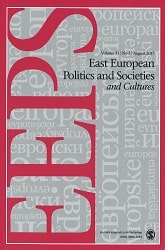Aid Paradox: Strengthening Belarusian Non-democracy through Democracy Promotion
Aid Paradox: Strengthening Belarusian Non-democracy through Democracy Promotion
Author(s): Alexei Pikulik, Sofie BedfordSubject(s): Political history, Government/Political systems, International relations/trade, Transformation Period (1990 - 2010)
Published by: SAGE Publications Ltd
Keywords: democracy promotion; Belarus; autocracy; donors; opposition; elections; post-Soviet politics; democratization;
Summary/Abstract: This article focuses on paradoxes of democracy promotion aid and offers research on an understudied topic: the microlevel of incentives facing donors and receivers of aid and its overall effect on the stability of authoritarianism. It argues that in the Belarusian case traveling the democracy promotion road, donors and implementers faced a typical bureaucratic problem: It became easier and more rational to justify the continuation of the democracy promotion project at large rather than closing it down, even though it was becoming increasingly clear it was not providing the desired results, that is, bringing about democratization or even a step in that direction. This created negative stimuli for the local beneficiaries, who developed strong aid addiction. A co-dependency between the providers and receivers of foreign aid led to the continuous application of unfit and self-defeating strategies. In fact, all of the actors involved (Western donors, implementers, and the Belarusian opposition but also the regime) became rationally interested in the status quo. As a result we argue that the democracy promotion efforts strengthened autocratic rule in Belarus rather than bringing about democratization.
Journal: East European Politics and Societies
- Issue Year: 33/2019
- Issue No: 02
- Page Range: 378-399
- Page Count: 22
- Language: English
- Content File-PDF

